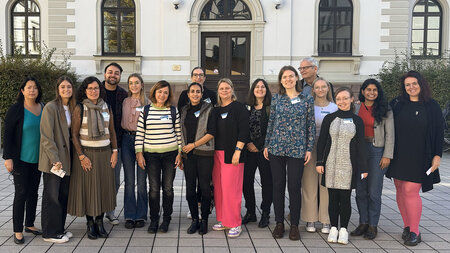Can a Smart Housing Increase the Safety of Battery Packs?
New european project on smart lightweight functionalized materials for housing of batteries leaded by Chemnitz University of Technology.
-

SmartHouB project consortium. The project coordinator is Prof. Dr. Olfa Kanoun, holder of the Chair of Measurement and Sensor Technology at Chemnitz University of Technology. Image: Chair for Measurement and Sensor Technology
The EU-funded project “SmartHouB - Smart Lightweight Functionalized Materials for Housing of Batteries” aims to develop novel, functional, intelligent housings for batteries by combining printed sensors and interconnectors with lightweight structural composites and metal layers. Integrated polymer sensors monitor the temperature distribution in every module and infer to the temperature behaviour of the individual cells. The novel technology is suitable for all types of battery cells and doesn’t need the integration of additional temperature sensors in the cells to guaranty security and safety.
The project is running from 15th of June 2021 to 31st of May 2024 and includes four partners from three countries Chemnitz University of Technology represented by the Chair for Measurement and Sensor Technology and the endowed professorship "Textile Plastic Composites and Hybrid Compounds" (Germany), İzmir Katip Çelebi University (Turkey), University of Sao Paulo (Brazil) and Bevi Plastic Ltda. (Brazil). The four partners have rich and unique expertise in different areas such as sensors fabrication, integration, validation and nanomaterial synthesis. Furthermore, this extends to the characterization, modelling and development of the hybrid laminate system for battery housing, as well as the characterization, validation and development of a joining procedure, which are essential for successful completion of a multi-disciplinary project.
“The novel technology developed in SmartHouB is highly relevant to the growing market of battery applications including e-mobility, e-bikes and consumer electronics,” annotates Prof. Dr. Olfa Kanoun, holder of the Chair of Measurement and Sensor Technology at Chemnitz University of Technology coordinator of the project.
To identify potential applicability of the SmartHouB results in different sectors, an industrial advisory board is established and comprises two companies: 1) Rutronik Elektronische Bauelemente GmbH - Battery pack and BMS, 2) Automotive Research GmbH - Recycling and second life. “The new family of lightweight and sensing materials would open a new range of applications in other strategic areas e.g., related functional materials, batteries and sensors,” says Prof. Olfa Kanoun.
Background: Project “SmartHouB”
The introduction of large-area, flexible, printed electronics enables a significant reduction of wiring and assembly efforts. SmartHouB goes one step further and integrates a big number of printed electronics in a material system used for the mechanical structure of a battery pack. Carbonaceous polymer nanocomposites based on CNTs, doped CNTs, graphene and metal nanoparticles will achieve sensors with high temperature sensitivity as well as interconnections with a significantly low resistivity. The use of the novel laminate system will offer several advantages, such as a high strength-to-weight ratio, high temperature, shock and penetration resistance. In addition, friction stir welding processes in combination with adhesive bonding to join the hybrid laminates will allow the use in many applications such as electromobility. The overall performance of the battery housing will be investigated according to international standards for batteries by developing a representative model on a laboratory basis and validating it at a technology readiness level 4.
The project is funded by the European Union within the programm M-ERA.NET. M-ERA.NET is a network of public funding organizations which has been established to support and improve the coordination of European research programs and related funding in materials science and engineering, especially for batteries, and with a high focus on the support of the European Green Deal. SmartHouB addresses the “Functional materials” topic of the M-ERA.NET 2020. The project is supported by the Sächsiches Staatsministerium für Wissenschaft, Kultur und Tourismus (SMWK), the Sächsiche Aufbaubank (SAB), the Scientific and Technological Research Council of Turkey (TÜBİTAK) and Fundação de Amparo à Pesquisa do Estado de São Paulo (FAPESP).
Homepage of the project: https://www.tu-chemnitz.de/etit/messtech/SmartHoub
Additional information is available from Prof. Dr. Olfa Kanoun, phone +49 371 531- 36931, e-mail olfa.kanoun@etit.tu-chemnitz.de.
(Author: Prof. Dr. Olfa Kanoun)
Mario Steinebach
13.05.2022





